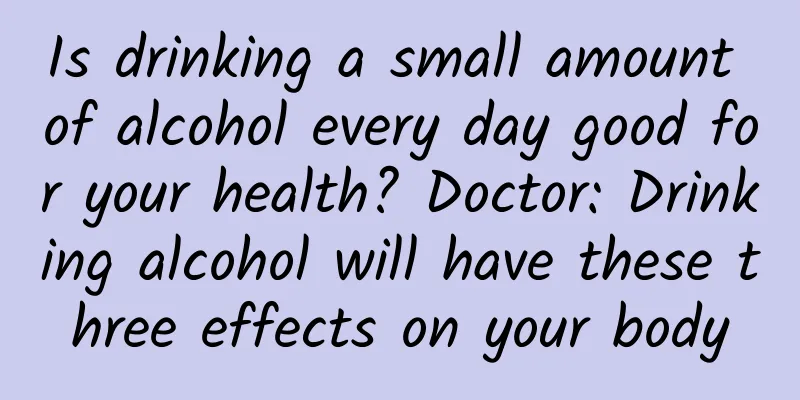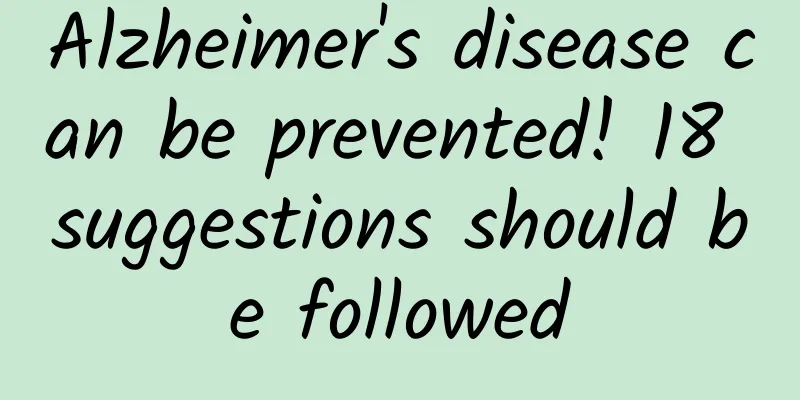Is drinking a small amount of alcohol every day good for your health? Doctor: Drinking alcohol will have these three effects on your body

|
Wine culture is a very important part of Chinese food culture. Many people have the habit of drinking a little every day. Some people say that drinking moderately is good for health, while others say that drinking is harmful to the body. So what is the truth? Today we will explain in detail the relationship between drinking and health. Is moderate drinking good or bad for the body? Common words used to persuade people to drink include "moderate drinking is good for health", "red wine can fight cancer", "moderate drinking can soften blood vessels", etc., but all of these are false. Someone will surely ask: “Is there any scientific basis for what you said?” As a master of clinical medicine who has received formal scientific research training, he is best at presenting evidence. The American Society of Clinical Oncology (ASCO) has clearly pointed out that alcohol is an important carcinogenic factor. The famous clinical medicine journal The Lancet also published an article in 2018 stating that alcohol is "zero" safe for the human body. In other words, even drinking just a drop of alcohol is of no benefit, and the article listed alcohol as the seventh leading cause of death. In addition, the World Health Organization has classified alcohol as a Class I carcinogen. Has the resveratrol in red wine been proven to have antioxidant and anti-cancer effects? One of the main reasons why many people support wine is that the resveratrol in red wine has antioxidant and anti-cancer effects, so they believe that wine can fight cancer. Here I want to say: Any talk about effects without considering dosage is nonsense. Regardless of whether resveratrol really has antioxidant and anti-cancer effects, I specifically looked up the literature on resveratrol experiments on mice. For mice, 200mg/(kg·d) of resveratrol is clinically significant. In other words, if it is replaced by humans, a person weighing 60kg needs to take at least 750mg of resveratrol to have an effect. If we convert it according to the wine on the market, at least 150 bottles of wine a day may be consumed to have an effect. But who in reality can drink 150 bottles of wine a day? Even if someone dares to drink it, the side effects are far greater than the effect of resveratrol. People who blush when drinking have a higher risk of cancer. In daily life, the most debated issue is whether people with red faces can drink more or people with pale faces can drink more. More than one person told me that people who blush when drinking have a bottomless pit of alcohol tolerance. The reality is not like this. People who blush when drinking not only do not drink much, but their risk of cancer will be higher. When alcohol is drunk by the human body, it is decomposed into acetaldehyde by the action of alcohol dehydrogenase, and then decomposed into acetic acid by the action of acetaldehyde dehydrogenase. Asian men generally lack acetaldehyde dehydrogenase. When a large amount of acetaldehyde accumulates in the human body, it causes capillary dilation, resulting in red face after drinking. The latest research found that people with acetaldehyde dehydrogenase gene defects are more likely to develop cancer after drinking alcohol than those without defects. So those who blush after drinking should put down their wine glasses quickly. After all, your body is your own! What harm does drinking have on the human body? 1. Drinking can damage our brain The damage that alcohol does to our brains has been demonstrated in many papers with high impact factors. Take my own personal experience as an example. One year at the annual meeting of the department, I drank white wine, and because I can’t drink much, I got drunk. The next day, when I was doing surgery, my hands were shaking all the time, which is a typical brain damage. The cognitive function of people who drink for a long time will be greatly reduced, and the more they drink, the more serious the impact on the brain tissue. 2. Drinking increases the incidence of tumors It has been mentioned above that drinking alcohol will increase the incidence of tumors, among which oral cancer, laryngeal cancer, liver cancer, and esophageal cancer are all related to drinking alcohol. Alcohol causes damage to our digestive tract mucosa, and repeated stimulation can easily increase the incidence of cancer. 3. Drinking alcohol can damage the liver. When acetaldehyde dehydrogenase is deficient or relatively deficient, excessive acetaldehyde accumulates in the liver and can cause liver cell degeneration and necrosis. If you drink alcohol for a long time, the liver will be continuously damaged, which will cause irreversible damage, such as alcoholic fatty liver, alcoholic hepatitis, alcoholic cirrhosis and eventually develop into liver cancer. For those friends who like to drink, don't use the excuse that drinking is good for your health to paralyze yourself. For your health, try to stay away from alcohol. |
Recommend
Minimally invasive surgery for uterine fibroids, authoritative experts introduce the surgical process
Uterine fibroids are a relatively serious disease...
Treatment for severe hair loss in women
Hair loss is an unhealthy condition of our head. ...
Is bleeding in stool during late pregnancy a serious problem?
In the late stages of pregnancy, many mothers'...
What should I do if I don’t have a bowel movement after a cesarean section?
Caesarean section is a way of giving birth, which...
How to eradicate postpartum disease
During the confinement period, if girls do not fo...
What should women do if their uterus prolapses?
For women, once there is a problem with the uteru...
What is the normal amount of amniotic fluid at 33 weeks of pregnancy?
Do you know how the fetus absorbs nutrients in th...
Is it normal to have clear snot when going to the toilet?
If women find transparent snot-like substance in ...
How many days after menstruation do you ovulate?
In today's society, everyone advocates family...
How many months is 33 weeks of pregnancy
At 33 weeks of pregnancy, the pregnant woman has ...
I got pregnant 20 days after IUD removal.
The contraceptive ring is a contraceptive medical...
How many days after menstruation is clean can you get pregnant
Many women usually complain about the arrival of ...
What is the meaning and symbol of golden peanuts? Will red-skinned peanuts fade when soaked in water?
As a symbol of good fortune and happiness, peanuts...
What are women's preparations for pregnancy?
Many female friends are pregnant for the first ti...
Will I still have my period in the first month of pregnancy?
Menstruation occurs every month when a woman is n...









